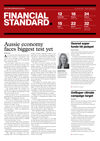Poor investment governance costly for asset owners, members: KPMG, FrontierBY ANDREW MCKEAN | MONDAY, 6 MAY 2024 2:15PMMost asset owners estimate that poor investment governance could increase portfolio costs by 1% or more annually, according to a joint report by KPMG and Frontier Advisors. The report, which surveyed 22 asset owners in the local investment industry representing $800 billion in total assets, indicated that in superannuation terms, a new worker aged 25 starting to save could face a financial disparity of $500,000 by retirement due to poor investment governance. However, on a more positive note, 62% of those surveyed believe that strong investment governance could yield a return benefit of at least 0.5% per annum over time. KPMG consulting partner Platon Chris said the survey demonstrates a very clear recognition of the potential value derived from, or potential capital eroded by, the gap between well-governed and poorly governed funds. "This comes from the coalface - the funds themselves. The importance of the implementation of robust investment governance frameworks by asset owners cannot be overstated," Chris said. Another finding from the survey was that 37% of survey respondents said they need to examine their investment portfolios through too many lenses - return, risk, peers, regulatory benchmarks, and ESG. Moreover, 33% of those surveyed feel there is too much focus on the short-term - and the long-term maximum benefit may not be the sum of a series of short-term time periods. Interestingly the top challenges nominated by asset owners were establishing a clear mission plan for investments; and having a plan that everyone understands and buys into. "Governance practices which have services us well in the past may not be as suitable for the future environment - the evolving landscape of technology, ESG, climate factors, a dynamic regulatory environment, coupled with the increasing globalisation of markets, is putting pressure on investment governance models and capabilities to adapt and innovate," Chris said. "Traditionally, investment governance structures have been rigid and hierarchical. With the current, and likely future environment being more volatile, investment governance models will need to exhibit the ability to be nimble and adapt, and avoid group-think through recongising the need for diversity in decision-making." Related News |

The Federal Budget is an "excellent down-payment" on clean energy - but fails on nature and biodiversity, gas, electrification, and ACCUs.
Stewardship is under-resourced as investors grapple with assessing how organisations align with the ambitions of clients and beneficiaries.
In this episode of The Greener Way, we hear from Simon Gvalda, manager of the ESG and Responsible Investment Recruitment team at Kaizen Recruitment, who recently released their much-awaited salary guide for ESG roles in 2024.
Investors face fund selection risk and a substantial disparity in performance when choosing sustainable investment strategies, especially when it comes to ESG exchange-traded funds (ETFs).















